Thoughts From the 2025 Lazarus Award Winner
By Jeffrey Perl, MD, Joel M. Topf, MD, FACP - Last Updated: April 22, 2025Jeffrey Perl, MD, is a staff nephrologist at St. Michael’s Hospital in Toronto and an associate professor of medicine at the University of Toronto. He spoke with Nephrology Times editorial board member Joel Topf, MD, in April at the National Kidney Foundation Spring Clinical Meetings 2025 in Boston, Massachusetts. There, Dr. Perl received the Michael J. Lazarus Award and gave the Lazarus lecture titled “Finding Our Way ‘Home,’” exploring trends in home dialysis utilization across North America and detailing how his own research focus has evolved in response to current challenges and future opportunities in this area.
Dr. Topf: Joel Topf with Nephrology Times. I’m here with Michael Lazarus Award winner Jeff Perl. Welcome, Jeff.
Dr. Perl: Thanks.
Dr. Topf: First of all, thanks for making the trip from Canada. That’s not as easy as it used to be.
Dr. Perl: No, no. Luckily, they let me in. [laughs]
Dr. Topf: It’s going back that might be the problem. I hope there’s no problems at all. Thank you for coming in. You just gave your talk accepting the Michael Lazarus Award. It was a barn burner of a talk. I’ve seen a bunch of these award winner talks. This was among the best. It had a lot of heart. I’m just going to kind of pick at the talk. I want to talk about some aspects of it. One of the things I loved is that you started off with, “Who’s Michael Lazarus?” You had an opportunity to meet him. Why don’t you fill us in?
Dr. Perl: It’s interesting to talk to him. He’s obviously been retired for quite some time, and it was just nice to hear the evolution of his career for somebody at my stage—to hear how he started off as a fellow, wanted to learn more about dialysis, and there were only a handful. It was not like he had many programs to choose between. He had like 4 or 5 and then decided to go to where he went: the Peter Bent Brigham Hospital. From there, [he] decided that he wanted to go to a large dialysis organization and have a bigger impact on a lot more patients, which he clearly…
Dr. Topf: He went to the biggest organization [Fresenius] and the biggest impact.
Dr. Perl: It was just nice to hear how much he enjoyed training and working with fellows and making sure that fellows got involved. He still said that people in academics really need to have a solid clinical focus too, which was inspiring to me. It resonated really well with me.
Dr. Topf: Well, that’s interesting because the beginning of your career was about membrane biology. You had a moment where you had to make a decision. Two paths diverge in the woods. Why don’t you talk a little bit about that?
Dr. Perl: At that point, you’re very junior, and it’s very easy to do what other people think you should do. But I think if I had to give advice to people, [I‘d say] “Let’s go with your heart and what you’re really going to have passion about.” I think a lot of people get into research and might be doing a specific project or [be in] an area because they have so much regard for their mentor.
But sometimes it’s really important to say, “Is this what I really want to do?” Because you’re going to be living, breathing, eating it day in and day out if you’re going to be doing research in it. It really has to be something that lights a fire under you. As much as I found that stuff interesting, I couldn’t relate to it in terms of the day-to-day management of our patients, which is what inspired me to get into research in the first place.
Dr. Topf: It’s pretty important to understand that you didn’t leave research. You just left that basic science, membrane biology, [research].
Dr. Perl: Yes, more translational. It had to be immediately relatable to the way we care for patients. The research that excites me the most is like this: we do a study now; tomorrow, here’s what we’re going to do differently based on the results. Whereas I think some of the more translational basic science stuff—yes, it’s foundational—but to get to the bedside is years and years and years of many more research milestones to get there. I’m like a fast-food researcher. I want it, and I want it to translate to the bedside.
Dr. Topf: That’s awesome. I think a lot of the work that you’ve done with international guidelines is about that, right?
Dr. Perl: Exactly. I think with the guidelines though, we actually know what to do. I think there’s a bigger problem in that we’re not doing it. Maybe we’re not all doing it. The guidelines are one opportunity for knowledge translation, but they’re one of many. We really need to think about other translation pathways so that we can get the information to the people that need to hear it.
Dr. Topf: One of the information sources you kept coming back to was the PDOPPS [Peritoneal Dialysis Outcomes and Practice Patterns Study], the idea that we could see variability in how we deliver this, and what can we learn from that variability?
Dr. Perl: I think we can learn from that variability that again, even though there’s things that are evidence based, like antibiotics at the time of catheter insertion and exit site prophylaxis, there’s still places that aren’t doing that.
I was actually surprised to hear, for example, in Japan, there’s no exit site prophylaxis for their patients because they’re really concerned about antimicrobial resistance, and they’re really worried about prophylactic antibiotics in general. I think that we are opening up a whole area of antibiotic stewardship, and maybe we are needing to evolve in terms of what we’re doing and the antibiotics we use, but also understanding that some places still aren’t following the guidelines.
Dr. Topf: You talked also about the potassium being related to that. Why don’t you share that? I just want to clarify that low potassium is a risk factor for peritonitis.
Dr. Perl: Low potassium is a risk factor for peritonitis. I’ve been guilty about research like this, which is observational. You show an association between A and B. Does A cause B? Is A associated with B? If we change A, will that impact B? A lot of people just sort of leave it there.
A classic example in nephrology is statin use. For cholesterol use and outcomes in dialysis, I’m sure there have been observational studies that have shown a benefit of cholesterol and outcomes. But until you do the 4D, until you do the SHARP study, until you do these randomized control trials, you really don’t know if the observational data are going to shake out.
What I really like about potassium is, here we have a story where low potassium increases the risk of peritonitis. Then it’s always, “Well, is it the low potassium or is it the type of patient that has a low potassium?” Is it a nutritional issue that makes that patient more susceptible to peritonitis? Then we’re left in this ambiguity saying, “Well, maybe we should replace potassium.”
But what I really liked about this particular area is our group in Thailand said, “That’s not good enough for us. We’re going to take it to an interventional study. We’re going to randomize patients to be more aggressive about potassium supplementation or less aggressive and show—which they did, published in AJKD [the American Journal of Kidney Diseases]—that aggressive supplementation and more proactive potassium supplementation reduce the risk of peritonitis. We have a really nice evolution of research: observational study, randomized trial, outcome; and now we can wholeheartedly take some advice back to the bedside.
Dr. Topf: That’s outstanding. One of the things that touched my heart is you have twins. I have twins.
Dr. Perl: A boy and a girl?
Dr. Topf: Boy and a girl twins. What did you learn being a father of twins? I want to hear your lessons.
Dr. Perl: Well, I can just say [that] people say, it must have been so hard to have twins. You’re basically dealing with 2 kids born at the same time. It’s double the diaper changes, double the feeds, double the amount of work. You’re on overdrive in the beginning, but if you think about, at 6 years, if I were to have had 2 kids that are 3 and 6 years, they wouldn’t play with each other; they wouldn’t keep each other company. So now we’re driving to the same school; they’re doing kind of the same activities. They’ve got the same circle of friends. It has kind of been advantageous that they’re the same age because they keep each other occupied. So early upfront work, later benefits.
Dr. Topf: The total number of diaper changes does not reduce if you separate the kids. They’re still going to poop the same amount.
Dr. Perl: Someone once asked me to give a talk about fear around home dialysis, and it was called “Home Hemophobia” or something like that. My analogy was, I’ve obviously never been on dialysis, but I thought, the scariest thing in my life so far was having kids and never having kids before. To me, hemophobia was like having 1 kid, and home hemophobia was like having twins. It’s just doing it yourself, doing it at home, double the work. That’s the only thing I can think of. It’s just like, next-level fear.
Dr. Topf: Outstanding. Congratulations on this [award]. This is amazing.
Dr. Perl: Thank you.

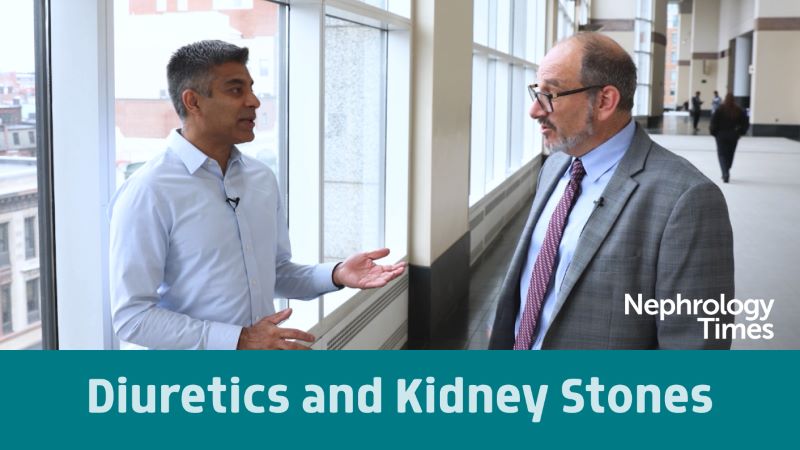
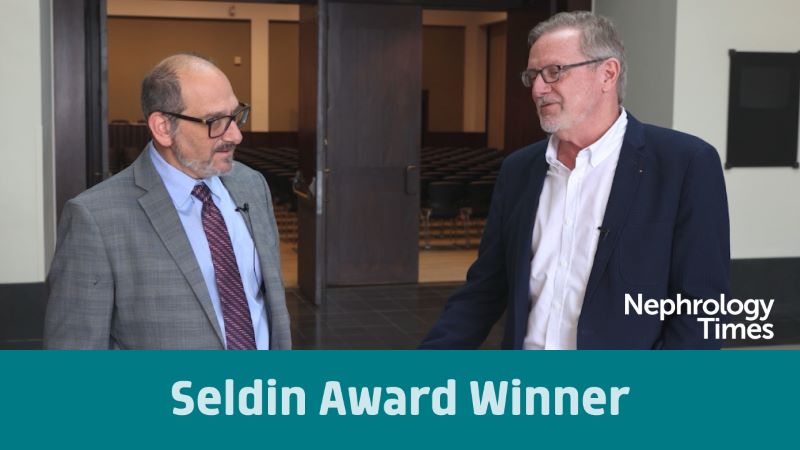
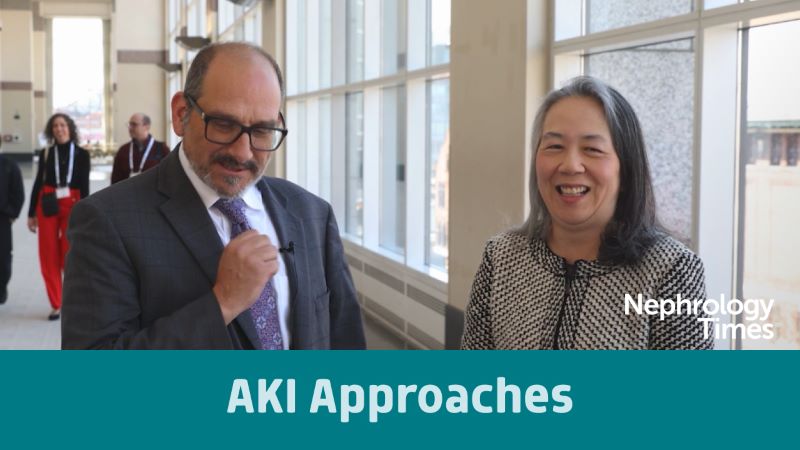
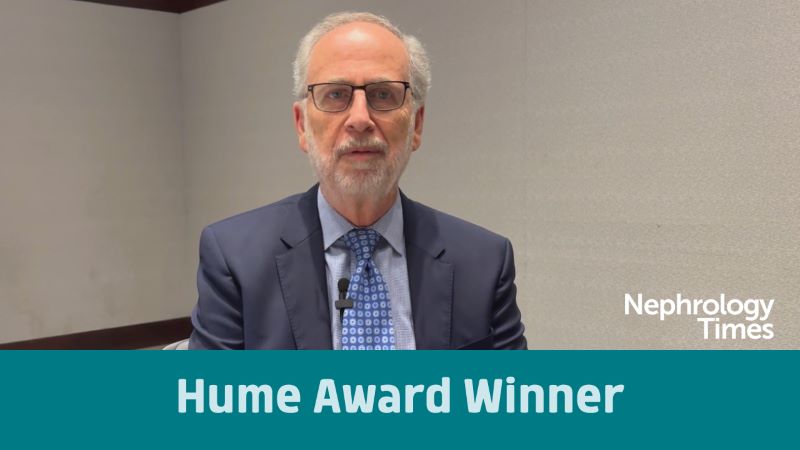
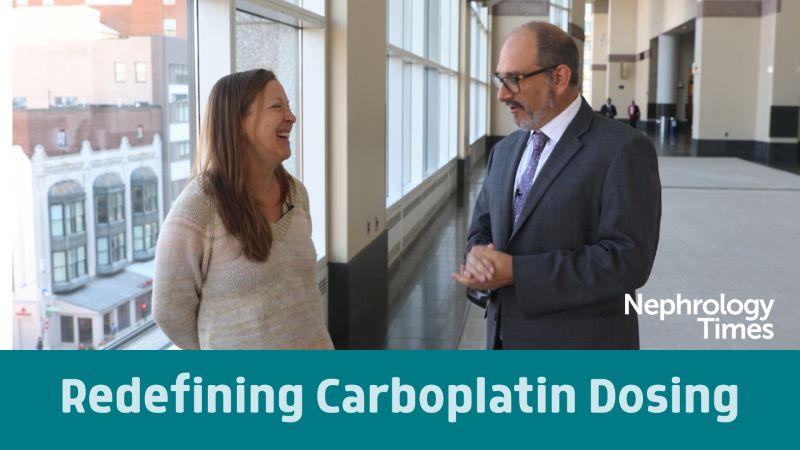

 © 2025 Mashup Media, LLC, a Formedics Property. All Rights Reserved.
© 2025 Mashup Media, LLC, a Formedics Property. All Rights Reserved.